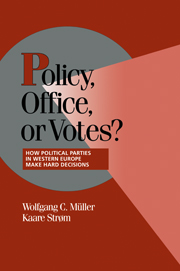Book contents
- Frontmatter
- Contents
- Figures
- Tables
- Contributors
- Chapter 1 Political Parties and Hard Choices
- Chapter 2 Office, Votes, and Then Policy: Hard Choices for Political Parties in the Republic of Ireland, 1981–1992
- Chapter 3 Party Behaviour and the Formation of Minority Coalition Governments: Danish Experiences from the 1970s and 1980s
- Chapter 4 From Policy-Seeking to Office-Seeking: The Metamorphosis of the Spanish Socialist Workers Party
- Chapter 5 Changing Strategies: The Dilemma of the Dutch Labour Party
- Chapter 6 Party Behavior in a Polarized System: The Italian Communist Party and the Historic Compromise
- Chapter 7 Decision for Opposition: The Austrian Socialist Party's Abandonment of Government Participation in 1966
- Chapter 8 Leadership Accountability and Bargaining Failure in Norway: The Presthus Debacle
- Chapter 9 Winner Takes All: The FDP in 1982–1983: Maximizing Votes, Office, and Policy?
- Chapter 10 Trade-offs in Swedish Constitutional Design: The Monarchy under Challenge
- Chapter 11 Parliamentary Rules and Party Behavior during Minority Government in France
- Chapter 12 Conclusions: Party Behavior and Representative Democracy
- Index
- Titles in the series
Chapter 1 - Political Parties and Hard Choices
Published online by Cambridge University Press: 05 May 2010
- Frontmatter
- Contents
- Figures
- Tables
- Contributors
- Chapter 1 Political Parties and Hard Choices
- Chapter 2 Office, Votes, and Then Policy: Hard Choices for Political Parties in the Republic of Ireland, 1981–1992
- Chapter 3 Party Behaviour and the Formation of Minority Coalition Governments: Danish Experiences from the 1970s and 1980s
- Chapter 4 From Policy-Seeking to Office-Seeking: The Metamorphosis of the Spanish Socialist Workers Party
- Chapter 5 Changing Strategies: The Dilemma of the Dutch Labour Party
- Chapter 6 Party Behavior in a Polarized System: The Italian Communist Party and the Historic Compromise
- Chapter 7 Decision for Opposition: The Austrian Socialist Party's Abandonment of Government Participation in 1966
- Chapter 8 Leadership Accountability and Bargaining Failure in Norway: The Presthus Debacle
- Chapter 9 Winner Takes All: The FDP in 1982–1983: Maximizing Votes, Office, and Policy?
- Chapter 10 Trade-offs in Swedish Constitutional Design: The Monarchy under Challenge
- Chapter 11 Parliamentary Rules and Party Behavior during Minority Government in France
- Chapter 12 Conclusions: Party Behavior and Representative Democracy
- Index
- Titles in the series
Summary
Political leaders routinely make momentous decisions, but they cannot always get what they want. Very often their important choices feel both difficult and painful. This is sometimes because these leaders have to act on the basis of incomplete information or because they realize that their options are risky. But it could also be because they have to abandon one goal to attain another. Politicians feel the tug between conflicting options as much as anyone else. Even when making decisions does not mean choosing the lesser of two evils, there may well be severe and uncomfortable trade-offs between different goals they have set themselves. Leadership frequently means making hard choices.
In modern democracies, the leaders who make these choices are highly likely to be party politicians or indeed party leaders. Political parties are the most important organizations in modern politics. In the contemporary world, only a few states do without them. The reason that political parties are well-nigh ubiquitous is that they perform functions that are valuable to many political actors. Political parties play a major role in the recruitment of top politicians, on whom the momentous and painful political decisions often fall. With very few exceptions, political chief executives are elected on the slate of some established political party, and very often the head of government continues to serve as the head of the political party that propelled him or her into office. Democracy may be conceived as a process by which voters delegate policy-making authority to a set of representatives, and political parties are the main organizational vehicle by which such delegation takes place.
- Type
- Chapter
- Information
- Policy, Office, or Votes?How Political Parties in Western Europe Make Hard Decisions, pp. 1 - 35Publisher: Cambridge University PressPrint publication year: 1999
- 118
- Cited by



